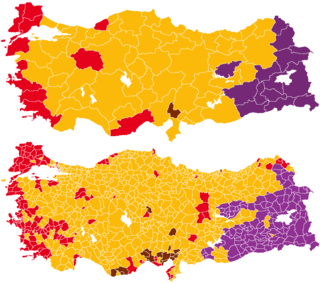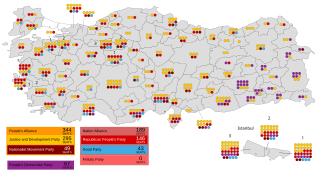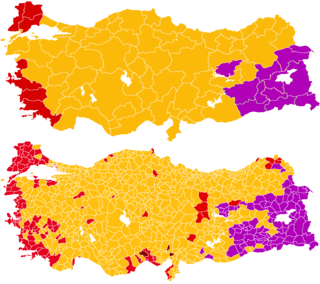
The Nationalist Movement Party is a Turkish far-right, ultranationalist political party. The group is often described as neo-fascist, and has been linked to violent paramilitaries and organized crime groups. Its leader is Devlet Bahçeli.

Devlet Bahçeli is a Turkish politician, economist, former deputy prime minister, and current chairman of the far-right, ultranationalist Nationalist Movement Party (MHP).

Kemal Kılıçdaroğlu is a Turkish politician and former leader of the Republican People's Party (CHP). He was Leader of the Main Opposition in Turkey between 2010 and 2023. He served as a member of parliament for Istanbul's second electoral district from 2002 to 2015, and as an MP for İzmir's second electoral district from 2015 to 2023.

Meral Akşener is a Turkish politician, teacher, historian and academic who is the founder and current leader of the Good Party.

Süleyman Soylu is a Turkish politician. He is a deputy chairman of the Justice and Development Party. He previously served as the Minister of Labour and Social Security from November 2015 to August 2016 and the Minister of the Interior from August 2016 to June 2023. He is a former leader of the Democrat Party (DP).

General elections were held in Turkey on 7 June 2015 to elect 550 members to the Grand National Assembly. This was the 24th general election in the history of the Turkish Republic, electing the country's 25th Parliament. The result was the first hung parliament since the 1999 general elections. Unsuccessful attempts to form a coalition government resulted in a snap general election being called for November 2015.

General elections were held in Turkey on 24 June 2018. Presidential elections were held to elect the President of Turkey using a two-round system. Parliamentary elections took place to elect 600 Members of Parliament to the Grand National Assembly of Turkey.

General elections were held in Turkey on 1 November 2015 to elect 550 members to the Grand National Assembly. They were the 25th general elections in the History of the Republic of Turkey and elected the country's 26th Parliament. The election resulted in the Justice and Development Party (AKP) regaining a parliamentary majority following a 'shock' victory, having lost it five months earlier in the June 2015 general elections.
The 11th Nationalist Movement Party Ordinary Congress was a political party convention held by the Turkish right-wing Nationalist Movement Party (MHP) on 21 March 2015. The Congress resulted in the re-election of Devlet Bahçeli as party leader, with rivals failing to obtain enough signatures to contest the leadership election.

The Second Cabinet of Ahmet Davutoğlu was a temporary election government formed by Prime Minister Ahmet Davutoğlu on the request of President Recep Tayyip Erdoğan. It is also referred to as the Second Davutoğlu Cabinet. As the 63rd government of Turkey, the cabinet presided over the November 2015 general election and dissolved after a new government is formed after the election. It is the first such government to take office in the history of the Turkish Republic.

Yıldırım Tuğrul Türkeş is a Turkish economist and politician, who served as Deputy Prime Minister of Turkey from 28 August 2015 to 19 July 2017. He first joined the interim election government formed by Prime Minister Ahmet Davutoğlu on 28 August 2015 as a Nationalist Movement Party (MHP) politician. He later defected to the Justice and Development Party (AKP) and was elected as an MP for the AKP in the November 2015 general election, continuing to serve as Deputy Prime Minister in the subsequent AKP majority government. He has been a Member of Parliament for Ankara's first electoral district since the 2007 general election and is the eldest son of the MHP's founder Alparslan Türkeş. He is the former leader of the Bright Turkey Party (ATP), which he led from 1997 to 2002.

The Nationalist Movement Party election campaign of June 2015 was the official election campaign of the Nationalist Movement Party (MHP) for the June 2015 general election in Turkey. The campaign was led by Devlet Bahçeli, who was contesting his fifth successive general election since being elected party leader in 1997.

A constitutional referendum was held in Turkey on 16 April 2017 on whether to approve 18 proposed amendments to the Turkish constitution that were brought forward by the governing Justice and Development Party (AKP) and the Nationalist Movement Party (MHP). As a result of its approval, the office of Prime Minister was abolished and the existing parliamentary system of government was replaced with an executive presidency and a presidential system. The number of seats in Parliament was raised from 550 to 600, while, among a series of other proposals, the president was given more control over appointments to the Supreme Board of Judges and Prosecutors (HSYK). The referendum was held under a state of emergency that was declared following a failed military coup attempt in July 2016.
The 2017 Turkish constitutional referendum 'No' campaign refers to a collection of unsuccessful political campaigns led by political parties, organizations and media outlets in favour of a 'No' vote in the 2017 Turkish constitutional referendum. Were the campaign to have been successful, it would have resulted in Turkey remaining a parliamentary republic as opposed to an executive presidency, which it became as a result of the referendum, and would have constituted the first direct upset against the governing Justice and Development Party (AKP) since they took office in 2002.

The Good Party is a nationalist and Kemalist political party in Turkey, established on 25 October 2017 by its current leader Meral Akşener. The party's name and flag is a reference to the tamga of the Kayı tribe.
The People's Alliance, abbreviated as PEOPLE, is an electoral alliance in Turkey, established in February 2018 between the ruling Justice and Development Party and the formerly opposition Nationalist Movement Party (MHP). The alliance was formed to contest the 2018 general election, and brings together the political parties supporting the re-election of President Recep Tayyip Erdoğan. Its main rival is the Nation Alliance, which was originally created by four opposition parties in 2018 and was re-established in 2019.

Parliamentary elections were held in Turkey on 24 June 2018 as part of general elections, with presidential elections taking place on the same day. Originally scheduled for 27 October 2019, President Recep Tayyip Erdoğan called snap elections on 18 April after months of speculation. With the passage of a series of constitutional amendments in the 2017 referendum, the number of MPs will be increased from the previous 550 to 600. These representatives will be elected by the constituents of the 87 electoral districts of Turkey by party-list proportional representation.
Multiple political parties in Turkey underwent candidate selection processes in the run-up to the 2018 presidential election. Parties represented in the Grand National Assembly were able to field candidates directly by collecting signatures from at least 20 of their Members of Parliament, as were parties who had no representation but won more than 5% in the previous general election. Candidates that did not meet either criterion were required to obtain over 100,000 signatures from Turkish citizens between 4 and 9 May.
The 12th Nationalist Movement Party Ordinary Congress was a political party convention held by the Turkish right-wing Nationalist Movement Party (MHP) on 18 March 2018. The Congress resulted in the re-election of Devlet Bahçeli as party leader, having been the only candidate.

The June 2019 Istanbul mayoral election was held on 23 June 2019. It was a repeat of the March 2019 mayoral election, which was annulled by the Supreme Electoral Council (YSK) on 6 May 2019. The original election had resulted in a narrow 0.2% margin of victory for opposition candidate Ekrem İmamoğlu, causing the governing Justice and Development Party to successfully petition for a by-election.















